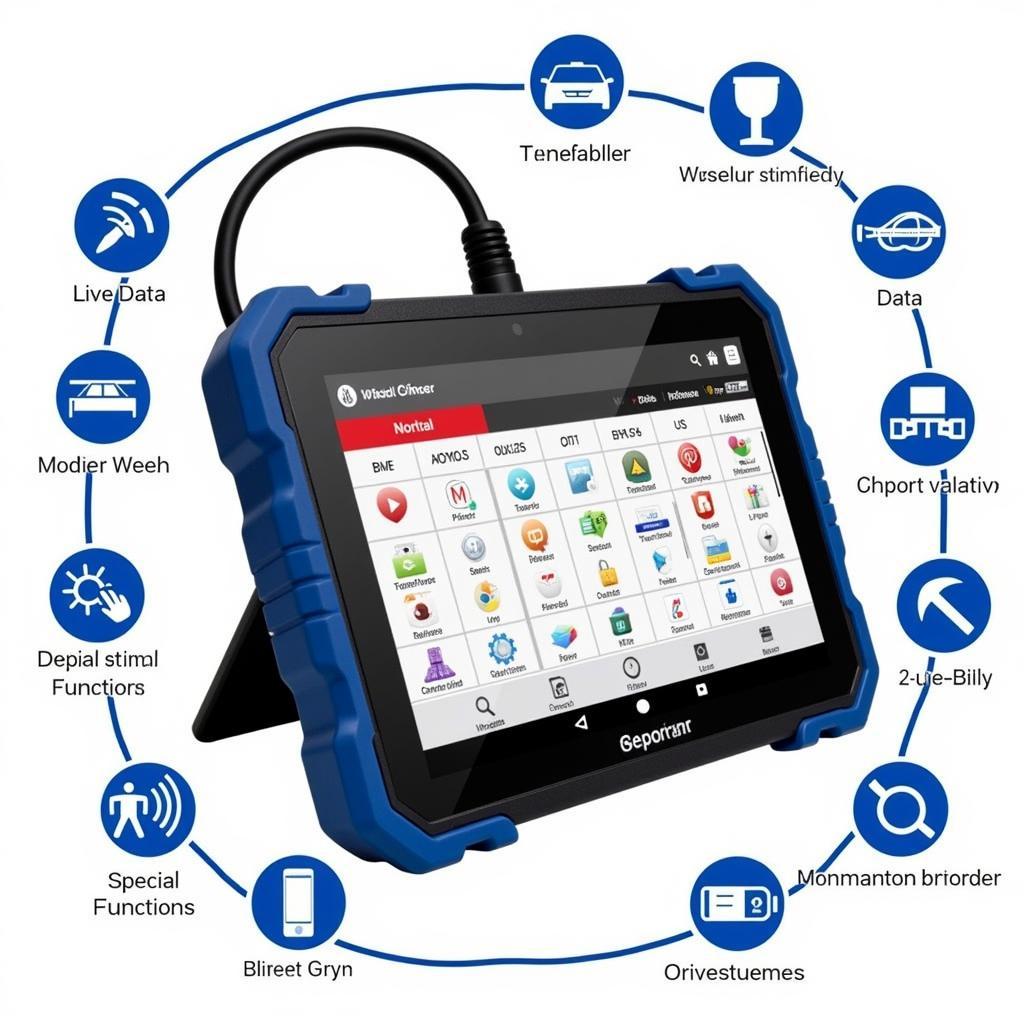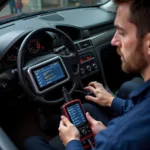Finding the best diagnostic car tool can feel like navigating a minefield. With so many options available, from basic code readers to professional-grade scan tools, it’s tough to know where to start. This article aims to simplify the process, guiding you through the key features, considerations, and top recommendations to answer the question: what is the best diagnostic car tool to buy for your needs? We’ll cover everything from budget-friendly options to high-end tools, ensuring you make an informed decision. See our guide to best buy car diagnostics.
Understanding Your Diagnostic Needs
Before diving into specific tools, it’s crucial to assess your needs. Are you a DIY enthusiast looking to troubleshoot basic car problems? Or are you a professional mechanic needing advanced functionalities? This will significantly impact your choice. For DIYers, a simple code reader might suffice, providing access to basic diagnostic trouble codes (DTCs). However, professional mechanics require more sophisticated tools with features like live data streaming, bi-directional controls, and special functions for specific car makes and models.
Consider also the types of vehicles you’ll be working on. Some diagnostic tools are specifically designed for certain car brands, while others offer broader compatibility. If you primarily work on European cars, for instance, a tool specializing in European makes might be a good investment. For other makes and models, please check out our vw car diagnostic tool guide.
Key Features to Look For
Once you’ve identified your needs, consider the following key features:
- Code Reading and Clearing: This is a fundamental function of any diagnostic tool. It allows you to retrieve and clear DTCs, which are essentially error codes that indicate a problem with your car.
- Live Data Streaming: This feature allows you to view real-time data from various sensors in your car, such as engine RPM, coolant temperature, and oxygen sensor readings. This is invaluable for diagnosing intermittent problems.
- Bi-directional Controls: With this feature, you can activate various components in your car, such as fuel injectors, solenoids, and relays. This allows you to test components and pinpoint the source of a problem.
- Special Functions: Some tools offer special functions tailored to specific car makes and models. These functions can include things like key programming, DPF regeneration, and ABS bleeding.
- User Interface and Software: A user-friendly interface and intuitive software can make a big difference in your overall experience. Look for tools with clear displays, easy navigation, and regular software updates.
- Connectivity: Most modern diagnostic tools offer Bluetooth or Wi-Fi connectivity, allowing you to view data on your smartphone or tablet. This provides greater flexibility and portability.
Choosing the Right Diagnostic Tool: Budget vs. Features
One of the most important considerations is your budget. Diagnostic tools range in price from under $100 to several thousand dollars. Check out our best car diagnostic tool under 100 for budget friendly options. The price typically reflects the tool’s capabilities and features. If you’re a DIYer on a tight budget, a basic code reader might be sufficient. However, if you’re a professional mechanic, investing in a more advanced tool with comprehensive features is essential. It’s also wise to check the diagnostic car tool price before buying.
What is a good diagnostic tool for a beginner?
A good starting point for beginners is a basic OBD-II code reader. These are relatively inexpensive and can read and clear basic engine codes.
What is the most advanced car diagnostic tool?
The most advanced car diagnostic tools offer comprehensive functionalities, including live data streaming, bi-directional controls, and special functions for specific car makes. They often come with advanced software and connectivity options.
Conclusion
Choosing the best diagnostic car tool requires careful consideration of your needs, budget, and the features available. Whether you’re a DIY enthusiast or a seasoned professional, there’s a tool out there to fit your requirements. By understanding the key features and exploring the different options, you can make an informed decision and invest in a diagnostic tool that will serve you well for years to come. And if you’re considering buying a used car, a diagnostic tool can be an invaluable asset in assessing its condition. See our page on diagnostics for cars for sale for more information.
FAQs
- Do I need a diagnostic tool if my car has a check engine light? Yes, a diagnostic tool is essential for retrieving the specific code that triggered the check engine light.
- Can I use a diagnostic tool on any car? Most diagnostic tools work on OBD-II compliant vehicles (1996 and newer in the US).
- How often should I use a diagnostic tool? It’s recommended to use a diagnostic tool whenever you experience car trouble or suspect a problem.
- Are there diagnostic tools for specific car brands? Yes, some tools are designed for specific brands and offer more in-depth diagnostics and functionalities.
- Do I need to update the software on my diagnostic tool? Regular software updates are essential for ensuring compatibility with newer car models and accessing the latest features.
- Can a diagnostic tool fix my car? A diagnostic tool helps identify problems but doesn’t fix them directly. It provides information needed for repairs.
- What is the difference between a code reader and a scan tool? Code readers retrieve and clear DTCs, while scan tools offer more advanced functionalities like live data and bi-directional controls.
Do you have any other questions related to car diagnostics? Are you curious about the latest advancements in diagnostic technology? Explore our other resources on car repair and maintenance to stay informed and empowered as a car owner.
Need help? Contact us on WhatsApp: +1(641)206-8880, or email us at [email protected]. We have a 24/7 customer support team ready to assist you.



